Super Tuesday Won’t Be So Super In 2012
The primary calendar is going to look very different next year.
Super Tuesday has been a fixture on the primary calendar since roughly 1988, reaching a peak in 2008 when 24 states held primaries on the same Tuesday in February. Next year, though, Super Tuesday is likely to exist in name only:
Pundits have hyped it. Candidates have built entire campaigns around it. And it has long served as the climax of presidential primaries. But next year, “Super Tuesday”—that one-day cluster of contests that has long served as the zenith of presidential primaries—will shrink to near oblivion. And the result, experts say, will be a 2012 race unlike anything the country has seen in decades.
The calendar is still in flux, but assuming the current dates hold, next year’s Super Tuesday will include just nine primaries, down from 24 in 2008.
The reasons for the sudden downsizing are varied. Red states are jockeying for greater influence on the GOP race this year by moving up their primary dates. Meanwhile, blue states are pushing their contests back into the spring, happy to extend Republican infighting as long as possible (and support the unchallenged Democratic incumbent). And with the Great Recession wreaking havoc on local governments’ budgets, some states are simply canceling the primaries altogether—or consolidating them with statewide elections—in order to save money.
The shift could fundamentally redefine the way the parties nominate their candidates—and alter the course of next year’s presidential primary race.
“It doesn’t look like there will be a knockout punch,” says Josh Putnam, a political science professor at Davidson College who blogs at Frontloading HQ. “It’s not like it has been, where some candidate has kind of established some measure of dominance in the early states, and then that person does well coming out of Super Tuesday and essentially wraps up the nomination. We won’t see that this time around.”
Much of this is still up in the air, mostly because the primary schedule has not been set in stone yet and states like Florida are threatening to throw things into chaos by attempting to schedule a primary before either Iowa or New Hampshire. If it holds, however, it’s like to mean that the GOP nomination fight will be stretched out far longer than it has been for many years. In 2008, John McCain had wrapped by the nomination by early February. In 2000, it took until Super Tuesday itself on March 7th for George W. Bush to deliver the knockout punch, although he was dominating John McCain long before then. In 1996, Bob Dole had no serious competition after the New Hampshire primary. And, in 1988, George H.W. Bush had put Bob Dole behind him by the time Super Tuesday rolled around on March 8th. This time, it’s likely to be well into March, or even April, before anyone has garnered enough delegates to be the presumptive nominee.
This kind of primary calendar obviously favors candidates who are able to raise a lot of money and put together a strong organization. In other words, Mitt Romney, Michele Bachmann, and Rick Perry. I don’t see candidates like Herman Cain or Tim Pawlenty being able to hold up for the long haul of a primary fight that lasts into the spring.
The real beneficiaries of a long primary process, though, are the voters, and, potentially, the Republican Party itself:
Generally, Hull says, voters benefit from a longer primary process. Instead of would-be nominees spending all their time pandering to a handful of early-voting states in hopes of gaining momentum for Super Tuesday, candidates will have to address a broader array of topics.
“Iowa tends to center on farm issues, and New Hampshire Republicans care most about taxes, so that’s what we hear a lot of from the candidates,” Hull says. “To the extent that the primary is extended and there are more states that play roles in the process, you’ll see more issues and a broader debate that would probably be a good and healthy thing.”It might also give the press corps more time to vet the various candidates and uncover any still-closeted skeletons that have yet to emerge. But even if the longer process fails to produce a big scandal, Hull says, a stretched-out primary will give voters greater opportunity to see the candidates’ true colors. “You’ll learn about them as the process goes on. You’ll see them in triumph, you’ll see them in defeat”—and these glimpses can help voters decide which lever to pull, he posits.
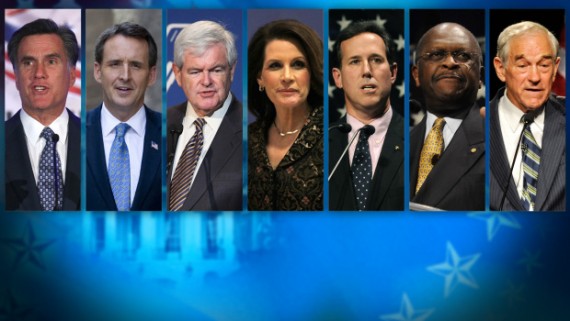


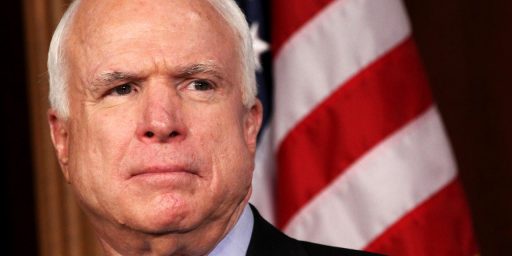
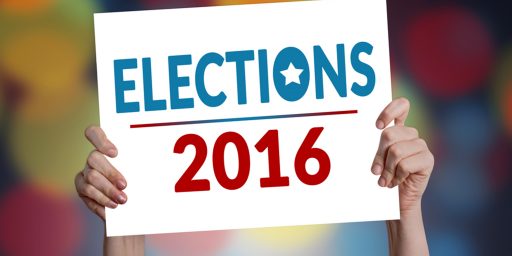
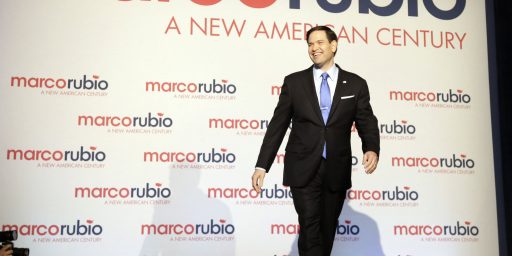
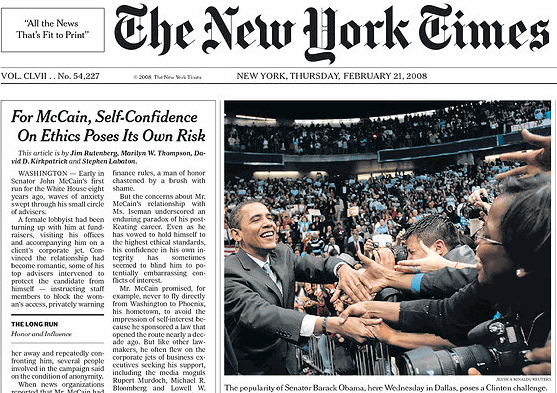
I don’t see an upside for the GOP.
Extra weeks and months of Michelle Bachmann and/or Rick Perry attacking MItt Romney? And more importantly, all the money that will cost? To gain what? More attention to Romney? Romney’s not a guy you like more the more you see of him. He’s a guy that starts to seem more and more unreal and inauthentic over time.
And don’t forget: the Tea Party won’t shut up.
@michael reynolds: I agree – the Republicans have one candidate who can win, Romney. Having him pummeled by the Tea Party for several months can’t increase his chances to win. And this is right on:
What an uninspiring bunch of mugs.
There are three tickets out of Iowa and two tickets out of New Hampshire. No one comes from behind. If Obama would have won New Hampshire, the Democratic primary would have lasted one week in January 2008.
SuperTuesday still still important because it marks the end of the process even if it is only nine state. The candidate that dominates that day (one of the top two finishers out of New Hampshire) will be declared the winner.
All of the talk of a long primary season (even though Clinton had zero chance to win unless Obama would have been caught in bed with a dead girl or a live boy), the talk of a brokered convention, or worrying about a broked convention are idiotic.
The media reaches a consensus at the end of SuperTuesday and that is all that matters.
Actually the money boys reach a consensus and that’s what typically matters much more than the media.
But the Tea Party has its own sources of cash that may not rely on the usual electoral consensus. They can keep the crazy coming right up to the end. And they can run an independent if they decide to.
@michael reynolds:
I’m not really sure that is really true. Take a look at the sources – plutocrats like the Koch brothers. Do you really think they are going to keep writing checks when it might lead to an Obama reelection. The Tea Party will starve to death -sooner rather than latter.
@Ron Beasley:
I’m honestly not sure.
If the Kochs and Dick Armey believe Obama’s going to beat Romney anyway, they may run an independent. Or if they conclude that Romney will moderate the GOP and thereby diminish their power — a likely outcome — they may prefer an Obama victory to fuel the hate and rage they feed on.
I don’t know.
@michael reynolds: You may be right. Good observation.
@michael reynolds:
The idea that money affects elections is massively overrated. Carly Fiorina spent over $100 million in California and had not chance to win and lost in a rout.
Money does not make up for demographics. Money does not make up for lack of charisma. The MSM can give the President Obama $100 millions of free, positive media. The Republicans have no chance to compete.
The idea that any Republican can be President Obama is laughable. Powerful people know to concentrate on affecting the government. There are much more cost effective ways to affect governance than trying to beat President Obama in 2012.
@superdestroyer:
Yeah, aside from the number one news network (Fox) being a 24/7 Republican propaganda machine. And all of talk radio. And the Wall Street Journal and various other newspapers. And the endless profusion of right-wing books from Regnery and others. And numerous conservative web sites.
So, aside from the giant, well-financed GOP media empire, yeah, they’re helpless.
@michael reynolds:
Compare that to the three major networks, CNN, MSNBC, CNBC, NPR, PBS, the editors of virtually every major newspaper in the U.S., and the liberals who work in the media in NYC, LA, SF, DC. How many conservatives actually live in the cities. How many conservatives work for any local NBC, ABC, CBS, or PBS affiliate. Even in the reddest states, the local media is always to the left of the population.
The Republicans only advantage is that people who are open to voting for Republicans are better at turnout versus the groups that automatically vote for Democrats.
The Democrats know that they have most of the advatnages and more than 90% of the people in charge of editorial content in the media are Democrats. Talk radio and Bill O’Reilly are insignificant versus the advantages that the Democrats have.
Oh please, this sad tired canard yet again…where is the proof for this lazy assertion…
Perhaps those groups that “automatically” vote for Democrats might be open to voting for Republicans if the GOP didn’t seem to show so much hostility towards them…
@superdestroyer:
Except that the republicans have changed the primary rules this season. This is the biggest issue affecting the process. In the past, republicans have played winner takes all. So winning the early primary’s even if you only got 35% or so of the vote could give you the nomination.
That has changed. Now it is proportional. So even if you win, if you dont win big, you are not going to wrap up the race early. Combine that with a strong tea party and a under whelming main stream candidate and you got the makings of a long run.
I think this is why so many main stream republicans are hyping Perry. They want 2 tea party candidates to run to divide that vote. They hope that will give Romney the cushion he need to win.
But I think Romney will perform poorer than people think. I think there is a decent chance this race goes way long (dare we dream, all the way to the convention?). And the longer it goes, the bigger the chance that Palin will jump in and really scramble the math.
Doug is right, this one is going to be a blast to watch.
@Jib:
The number of delegates selected is basically irrelevant since the primary season ends well before the convention. It is not the delgates that is important but the preception of being the winner.
Thus, no matter how few delegates that someone gets, who ever are the top three candidates get a ticket out of Iowa and the top two get a ticket out of New Hampshire. However is in the lead after not-so-super Tuesday will be declared the winner.
You’re the living proof that you’re wrong.
Obama can’t win without carrying at least one southern state. Ohio and Pennsylvania will go Republican. Even California might be up for grabs – polls show a lot of dissatisfaction.
LBJ gave the south to the Republicans long ago.
If unemployment is 6% or less, Obama can win. 9%+ : forget it, Repub. wins
Once again, anyone who tells us that California will be in play next year really can’t be taken seriously…
@superdestroyer:
Oh no, ask Obama, it really does matter how many delegates you get. And the primaries do not end until June.
Especially when you have an insurgent movement like the Tea Party. Try going to the convention without enough delegates and then try to bluff that bunch to a victory. If fact I very much hope that is what happens.
The tea party is not going to go along with some one because the pundits say they should. They would love nothing more than to to stick their thumbs in the eye of the media and pundits who would ordain a winner based on perception.
If you want the nomination, you will need the delegates. No shortcuts this time.